Fiction
Fiction

The Works of Guillaume Dustan (Vol. 1)
Guillaume Dustan' first three novels, published in French between 1996 and 1998, describing the narrator's sexual odyssey through a Paris still haunted by AIDS.
This volume collects a suite of three wildly entertaining and trailblazing short novels by the legendary French anti-assimilationist LGBTQ+ writer Guillaume Dustan. Published sequentially in France between 1996 and 1998, the three novels are exuberant and deliberately affectless accounts of the narrator's sexual odyssey through a Parisian club and bath scene still haunted by AIDS.
In My Room (1996) takes place almost entirely in the narrator's bedroom. The middle volume, I'm Going Out Tonight (1997) finds him venturing out onto the gay scene in one long night. Finally, in Stronger Than Me(1998) the narrator reflects on his early life, which coincided with the appearance and spread of the AIDS virus in France.
A close contemporary of Dennis Cooper, Brett Easton Ellis, Kevin Killian, and Gary Indiana, Guillaume Dustan's deadpan autofiction is at once satirical and intimate, and completely contemporary.
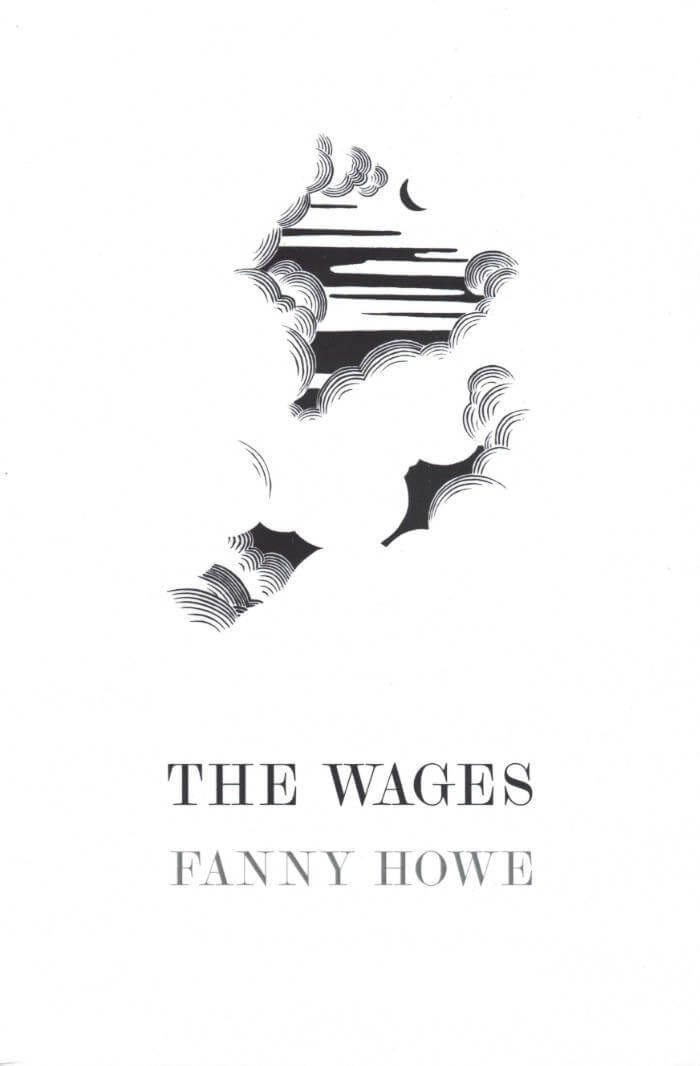
The Wages
Born amidst tragedy and implacable hatreds, the young Peter McCutcheon is denied his freedom, his birthright, and the fruits of his labors by cruel masters, and by a society and history which denies the truth.
THE WAGES is a monument to individual courage and to the ongoing injustices caused by the suppression of memories and the oppression of people. It is also a powerful document of America's entanglement in slavery and vicious myths of race. The wages of sin, according to the Bible, is death. Fanny Howe's novel demonstrates that the wages of hate are pain, and a cost not always borne by the perpetrator, or even the current generation.

Paul Takes the Form of a Mortal Girl
It's 1993 and Paul Polydoris tends bar at the only gay club in a university town thrumming with politics and partying. He studies queer theory, has a dyke best friend, makes zines, and is a flaneur with a rich dating life. But Paul's also got a secret: he's a shapeshifter. Oscillating wildly from Riot Grrrl to leather cub, Paul transforms his body and his gender at will as he crosses the country; a journey and adventure through the deep queer archives of struggle and pleasure. Paul Takes the Form of a Mortal Girl is a riotous, razor-sharp bildungsroman whose hero/ine wends his/her way through a world gutted by loss, pulsing with music, and opening into an array of intimacy and connections.
"HOT" (Maggie Nelson) - "TIGHT" (Eileen Myles) - "DEEP" (Michelle Tea)
Paul Takes the Form of a Mortal Girl is a riotous, razor-sharp bildungsroman whose hero/ine wends his/her way through a world gutted by loss, pulsing with music, and opening into an array of intimacy and connections.
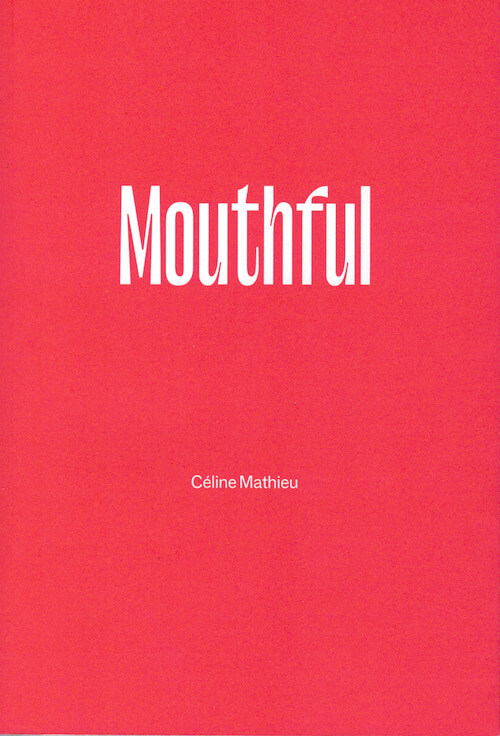
Mouthful
"She has fallen forward again, resting there like a reptile basking in the January sun. Where she was, in her corner, temperatures rose up to 28 degrees Celsuis. Her dry skin darkened, drinking the light."
In 2020, CMMC –Céline Mathieu and Myrthe van der Mark– were invited by organisers NICC Lodgers to perform at M HKA in Antwerp in response to art subsidy cuts in Flanders. Their contribution, The Writing Performance, was an attempt to write a novella each in three days, during the museum’s opening hours and in full sight of visitors. Throughout The Writing Performance, CMMC subsisted on water and sugar.
Published 2021.

At the Full and Change of the Moon
Written with lyrical fire in a chorus of vividly rendered voices, Dionne Brand's second novel is an epic of the African diaspora across the globe.
It begins in 1824 on Trinidad, where Marie-Ursule, queen of a secret slave society called the Sans Peur Regiment, plots a mass suicide. The end of the Sans Peur is also the beginning of a new world, for Marie-Ursule cannot kill her young daughter, Bola, who escapes to live free and bear a dynasty of descendants who spill out across the Caribbean, North America, and Europe.
Haunted by a legacy of passion and oppression, the children of Bola pass through two world wars and into the confusion, estrangement, and violence of the late twentieth century.
"[Brand has] a lush and exuberant style that may put some readers in mind of Toni Morrison or Edwidge Danticat." — William Ferguson, The New York Times Book Review
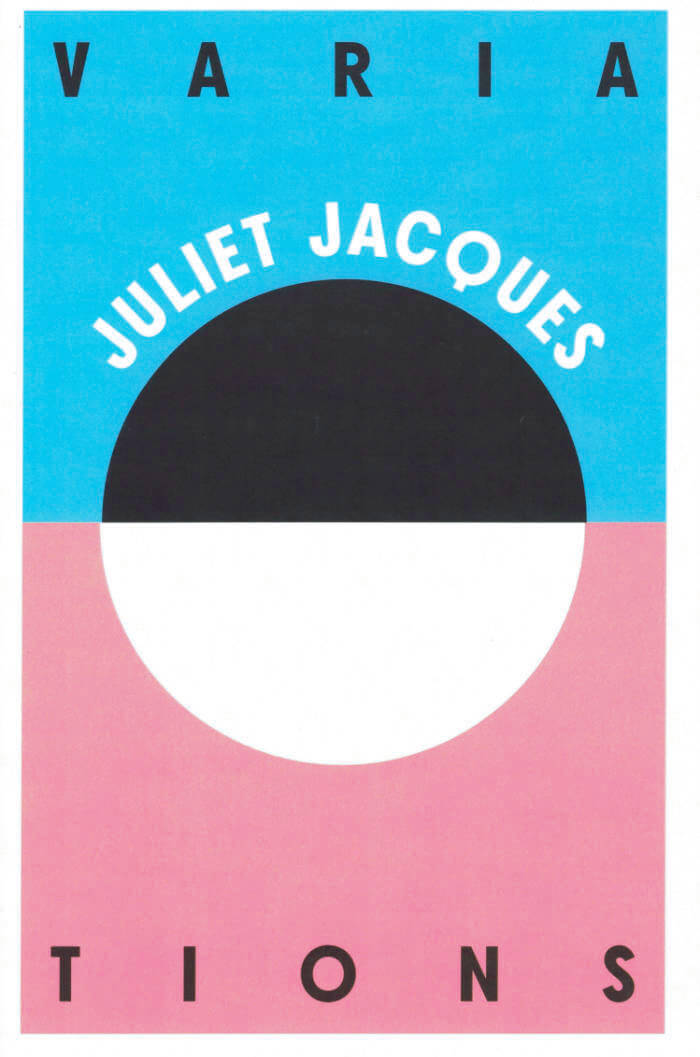
Variations
Variations is the debut short story collection from one of Britain’s most compelling voices, Juliet Jacques. Using fiction inspired by found material and real-life events, Variations explores the history of transgender Britain with lyrical, acerbic wit.
Variations travels from Oscar Wilde’s London to austerity-era Belfast via inter-war Cardiff, a drag bar in Liverpool just after the decriminalisation of homosexuality, Manchester’s protests against Clause 28, and Brighton in the 2000s. Through diary entries of an illicit love affair, an oral history of a contemporary political collective; a 1920s academic paper to a 1990s film script; a 1950s memoir to a series of 2014 blog posts, Jacques rewrites and reinvigorates a history so often relegated to stale police records and sensationalist news headlines.
Innovative and fresh, Variations is a bold and beautiful book of stories unheard; until now.

Since I Laid My Burden Down
A riotous, hilarious, and heart-breaking cult novel about growing up black, queer, and punk.
When DeShawn hears news of his uncle's death, his riotous big-city life in San Francisco is abruptly put on hold while he travels back to his Alabama hometown for the funeral.
While there, he’s hit by flashbacks of growing up queer and black in the ‘80s South, of a youth filled with strong women, bewildered boys, and messed up queers. Wading through prickly reminders of his childhood, of sweltering Sundays, church, family, and the men he once knew, DeShawn reconnects with his old self and the ghosts of his past.
A raw, dirty, hilarious, and heartbreaking novel about the experiences that shape us, Since I Laid My Burden Down asks the intimate question: who deserves love?
Brontez Purnell is a writer, musician, dancer, filmmaker, and performance artist. He is the author of a graphic novel, a novella, a children's book, and the novel Since I Laid My Burden Down. The recipient of a 2018 Whiting Writers' Award for Fiction, he was named one of the 32 Black Male Writers of Our Time by The New York Times Magazine. Purnell is also the frontman for the band the Younger Lovers, a co-founder of the experimental dance group the Brontez Purnell Dance Company, the creator of the renowned cult zine Fag School, and the director of several short films, music videos, and the documentary Unstoppable Feat: The Dances of Ed Mock. He lives in Oakland, California.

100 Boyfriends (UK edition)
Transgressive, foulmouthed, and wildly funny, Brontez Purnell's 100 Boyfriends is a filthy, unforgettable, and brutally profound ode to queer love in its most messy of variations. From one-night stands to recurring lovers, Purnell's characters sleep with their co-worker's husbands, expose themselves to racist neighbours, date Satanists, and drink their way out of trouble, all the while fighting - and often losing - the urge to self-sabotage.
A horny, punk love song full of imperfect intimacies, 100 Boyfriends takes readers on a riotous journey through dirty warehouses and gentrified bars, from dysfunctional houseshares to desolate farming towns in Alabama. Drawing us into a community of glorious misfits living on the margins of a white supremacist, heteronormative society, iconoclastic storyteller Brontez Purnell gives us an uncompromising vision of desire, desperation, race, loneliness, and queerness that will devastate as much as it entertains.

Near to the Wild Heart
Near to the Wild Heart, published in Rio de Janeiro in 1943, introduced Brazil to what one writer called "Hurricane Clarice" a twenty-three-year-old girl who wrote her first book in a tiny rented room and then baptized it with a title taken from Joyce: "He was alone, unheeded, near to the wild heart of life."
Narrative epiphanies and interior monologue frame the life of Joana, from her middle-class childhood through her unhappy marriage and its dissolution to transcendence, when she proclaims: "I shall arise as strong and comely as a young colt."
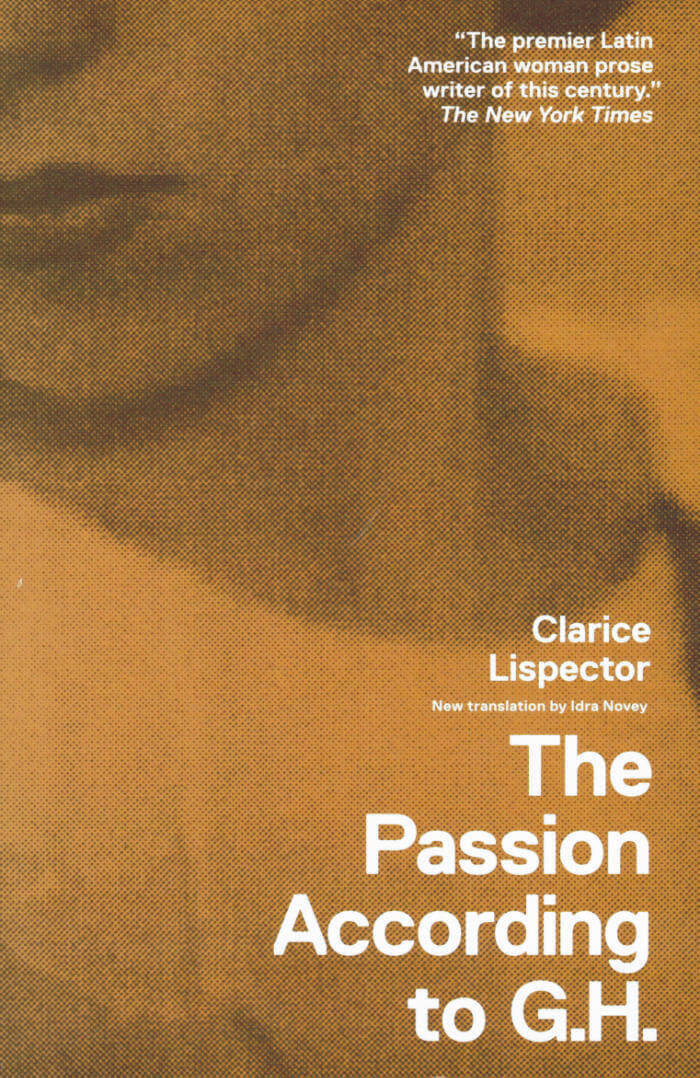
The Passion According to G.H.
The Passion According to G.H., Clarice Lispector's mystical novel of 1964, concerns a well-to-do Rio sculptress, G.H., who enters her maid's room, sees a cockroach crawling out of the wardrobe, and, panicking, slams the door, crushing the cockroach, and then watches it die. At the end of the novel, at the height of a spiritual crisis, comes the most famous and most genuinely shocking scene in Brazilian literature...
Lispector wrote that of all her works this novel was the one that "best corresponded to her demands as a writer."
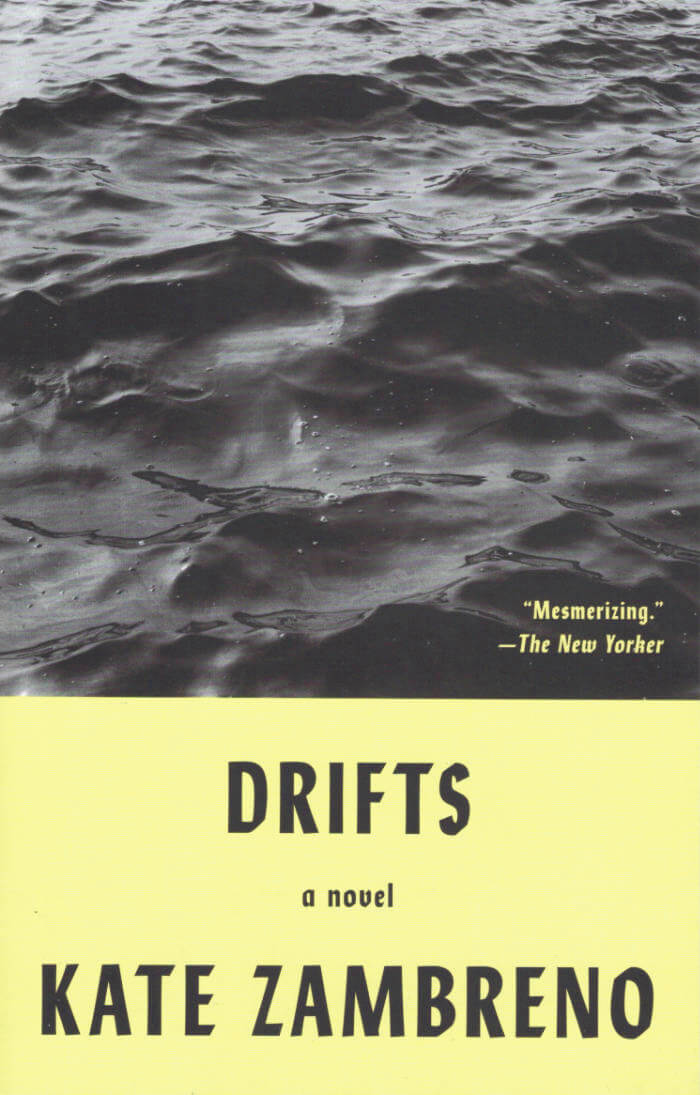
Drifts (paperback)
Haunting and compulsively readable, Drifts is an intimate portrait of reading, writing, and creative obsession. At work on a novel that is overdue, spending long days walking neighborhood streets with her restless terrier, corresponding ardently with fellow writers, the narrator grows obsessed with the challenge of writing the present tense, of capturing time itself. Entranced by the work of Rainer Maria Rilke, Albrecht Dürer, Chantal Akerman, and others, she photographs the residents and strays of her neighborhood, haunts bookstores and galleries, and records her thoughts in a yellow notebook that soon subsumes her work on the novel. As winter closes in, a series of disturbances—the appearances and disappearances of enigmatic figures, the burglary of her apartment—leaves her distracted and uncertain . . . until an intense and tender disruption changes everything.
A story of artistic ambition, personal crisis, and the possibilities and failures of literature, Drifts is the work of an exhilarating and vital writer.
Kate Zambreno is the author of several acclaimed books including Screen Tests, Heroines, and Green Girl. Her writing has appeared in The Paris Review, VQR, and elsewhere. She teaches in the writing programs at Columbia University and Sarah Lawrence College.
Published 2021

Last Utopia
The bilingual book (NL-EN) contains one chapter of her recent novel Exces (Prometheus, 2021), which she has been working on during her stay at the academy. Set in the rave scene of 90s' Berlin, Last Utopia sketches the emotional landscape of an era that was supposed to be liberated, a time when the future was ostentatiously hailed. Yet in between the markers of optimism and progress, the first cracks announcing the permanent crises of today are revealed. Understanding techno as narrative device, this short novella - which can be read independently from the novel - traces echoes of utopian imaginary.
Persis Bekkering is a sophisticated maker of scenes, her prose is strongly physical and immersive. In her work, human relations are scrutinized and exposed in its ambiguity. In 2018 she published her first novel, Een heldenleven (Life of a Hero) with Prometheus, which was shortlisted for the ANV Debut Prize. She writes essays, art - and literary criticism and columns, for Mister Motley, NRC Handelsblad and other publications. An excerpt of Last Utopia was used as libretto for Stine Janvin and Ula Sickle's concert performance Echoic Choir, which premiered at the Wiener Festwochen.

Vernon Subutex 3
As storm clouds gather, portending a final reckoning, ersatz rave-cult leader Vernon Subutex decides to return to Paris. Even if it means leaving behind his disciples. He has to. He’s got a dentist’s appointment.
Back in the city, he learns that an old friend from his days homeless on the Paris streets has died and left him half of a lottery win. But when Vernon returns to his commune with news of this windfall, it’s not long before his disciples turn on each other. Such good fortune does not accord with the principles Vernon has handed down.
Meanwhile, the monstrous film producer Laurent Dopalet is determined to make Aïcha and Céleste pay for their attack on him, whatever it takes and whoever gets hurt. And, before long, the whole of Paris will be reeling in the wake of the terrorist atrocities of 2015 and 2016, and all the characters in this kaleidoscopic portrait of a city and era will be forced to confront one another one last time. In the wake of all this chaos and hate, the question will rise again: After all he’s been through, who is Vernon Subutex? And the answer: He is the future.
Virginie Despentes’s epochal trilogy ends with Vernon Subutex 3—in fire, blood, and even forgiveness. But not everyone will survive to see the dawning of the golden age of Subutex.
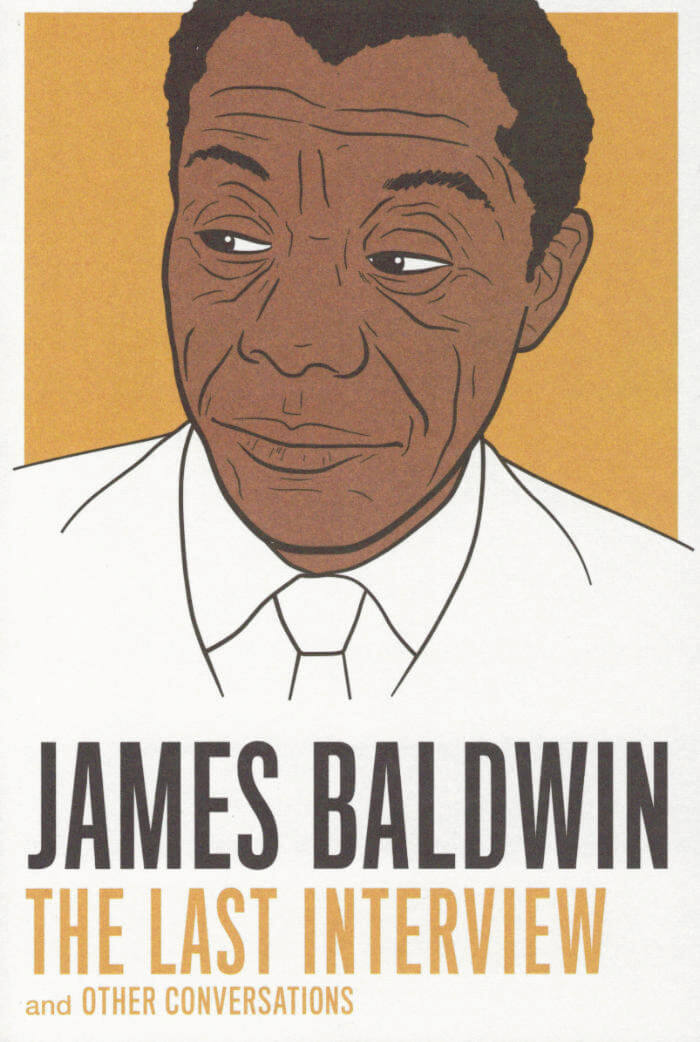
James Baldwin: The Last Interview: And Other Conversations
Never before available, the unexpurgated last interview with James Baldwin.
“I was not born to be what someone said I was. I was not born to be defined by someone else, but by myself, and myself only.” When, in the fall of 1987, the poet Quincy Troupe traveled to the south of France to interview James Baldwin, Baldwin’s brother David told him to ask Baldwin about everything—Baldwin was critically ill and David knew that this might be the writer’s last chance to speak at length about his life and work.
The result is one of the most eloquent and revelatory interviews of Baldwin’s career, a conversation that ranges widely over such topics as his childhood in Harlem, his close friendship with Miles Davis, his relationship with writers like Toni Morrison and Richard Wright, his years in France, and his ever-incisive thoughts on the history of race relations and the African-American experience.
Also collected here are significant interviews from other moments in Baldwin’s life, including an in-depth interview conducted by Studs Terkel shortly after the publication of Nobody Knows My Name. These interviews showcase, above all, Baldwin’s fearlessness and integrity as a writer, thinker, and individual, as well as the profound struggles he faced along the way.
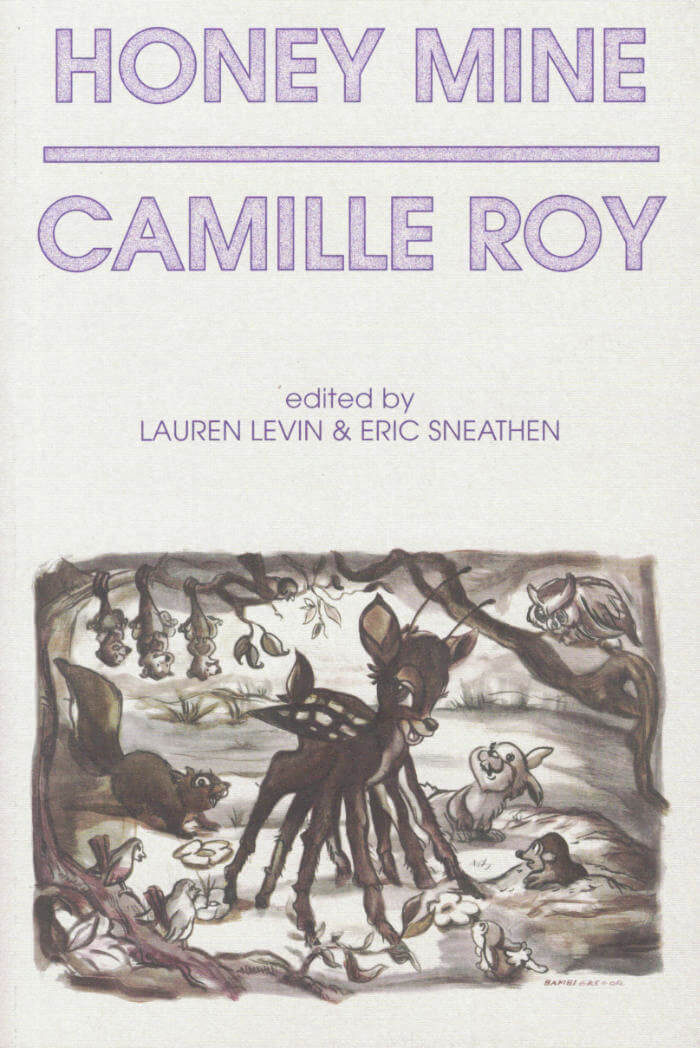
Honey Mine: Collected Stories
Honey Mine unfolds as both excavation and romp, an adventure story that ushers readers into a lesbian writer's coming of age through disorienting, unsparing, and exhilarating encounters with sex, gender, and distinctly American realities of race and class. From childhood in Chicago's South Side to youth in the lesbian underground, Roy's politics find joyful and transgressive expression in the liberatory potential of subculture. Find here, in these new, uncollected and out-of-print fictions by a master of New Narrative, a record of survival and thriving under conditions of danger.

Sterling Karat Gold
Sterling is arrested one morning without having done anything wrong. Plunged into a terrifying and nonsensical world, Sterling – with the help of their three best friends – must defy bullfighters, football players and spaceships in order to exonerate themselves and to hold the powers that be to account.
Sterling Karat Gold is Kafka’s The Trial written for the era of gaslighting – a surreal inquiry into the real effects of state violence on gender-nonconforming, working-class and black bodies.
Following the Goldsmiths Prize–nominated We Are Made of Diamond Stuff, Isabel Waidner’s latest novel proposes community, inventiveness and the stubborn refusal to lie low as antidotes against marginalisation and towards better futures.
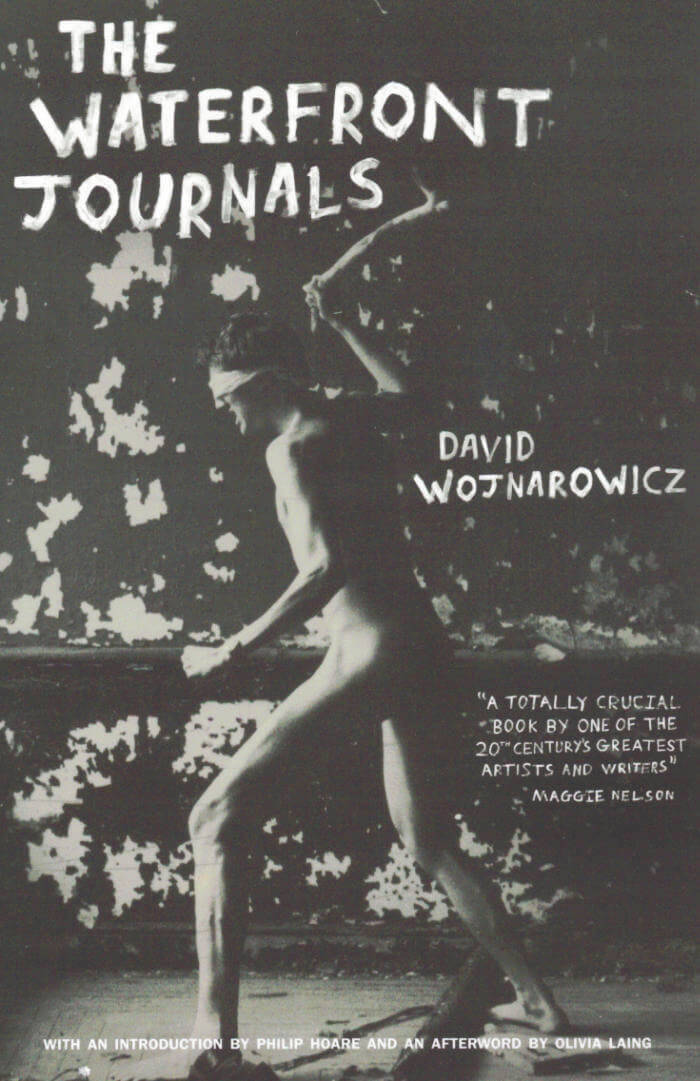
The Waterfront Journals
A visceral and carnivalesque mosaic of life at the fringes.
The Waterfront Journals is a road trip through the sensuous, perilous landscape of alternative America—a series of fictional monologues that ventriloquise the real people Wojnarowicz met on his travels while he was sleeping rough.
We meet these hustlers, runaways and dreamers in unassuming locations—in truck stops, bus stations and parks. Their stories are disturbing, often shocking; but they’re told with an honesty and a hallucinatory intensity that simply demands to be heard.
Published for the first time in the UK, this electrifying collection confirms that David Wojnarowicz was not only one of millennial America’s most necessary and visionary artists, but also among its most humane and urgent literary chroniclers.
Praise for The Waterfront Journals
A totally crucial book by one of the 20th century’s greatest artists and writers.—Maggie Nelson
Wojnarowicz proves that the difference between the rules of poverty and those of a dream is nothing more than smoke. The termination point of American life examined by the terminal American artist.—Jarett Kobek

Men and Apparitions
MEET EZEKIEL HOOPER STARK, cultural anthropologist and bemused commentator on the contemporary world. Zeke has carved out an academic career studying family photographs, gender and images. Meanwhile – now 38 – he still contends with his own family’s perversities and pathologies, which charge his chaotic love life.
While living in London, Zeke finds himself spiralling into crisis. As the centre ceases to hold, so too does any pretence of his having a dispassionate, purely academic interest in these issues.
Zeke finds a new research topic: himself. He embarks on a quixotic new project, studying the ‘New Man’, born under the sign of feminism. What, he asks his male subjects, does masculinity mean today, in a world in which all the old models are broken? What do you expect from women? What do you expect from yourself? Meanwhile, what will the reader make of Zeke – is he enlightened or misguided, chauvinistic or simply delusional?
Kaleidoscopic and encyclopaedic, comic, tragic, and philosophical, Men and Apparitions showcases Lynne Tillman not only as a unique novelist but also as one of our most important contemporary thinkers on art, culture and the politics of gender.
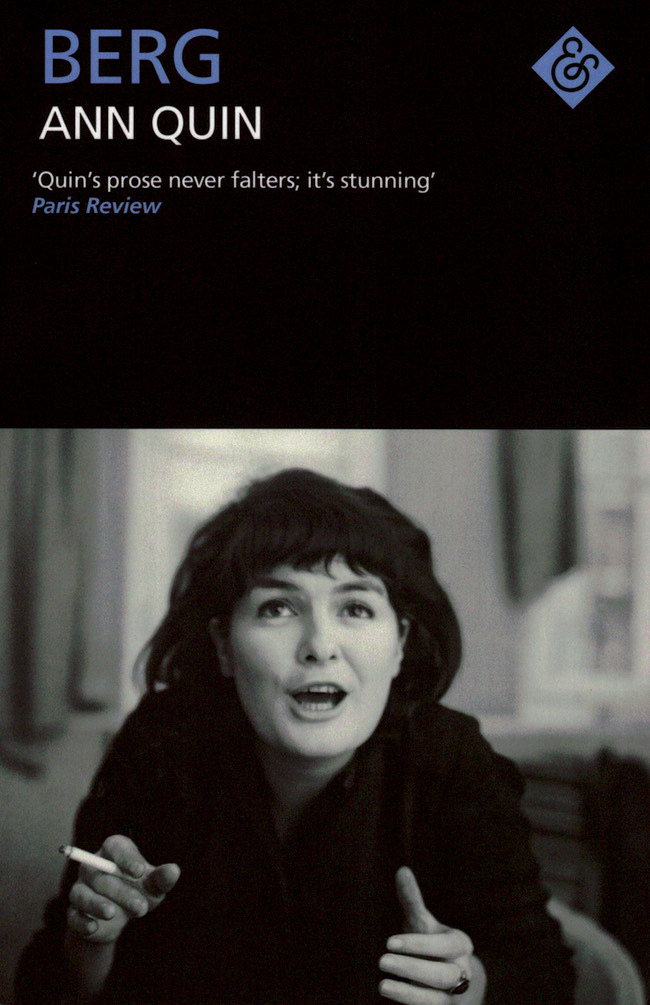
Berg
"A man called Berg, who changed his name to Greb, came to a seaside town intending to kill his father. . ."
So begins Ann Quin's madcap frolic with sinister undertones, a debut "so staggeringly superior to most you'll never forget it" (The Guardian). Alistair Berg hears where his father, who has been absent from his life since his infancy, is living. Without revealing his identity, Berg takes a room next to the one where his father and father's mistress are lodging and he starts to plot his father's elimination. Seduction and violence follow, though not quite as Berg intends, with Quin lending the proceedings a delightful absurdist humor.
Anarchic, heady, dark, Berg is Quin's masterpiece, a classic of post-war avant-garde British writing, and now finally back in print after much demand.
Ann Quin (b. 1936) was a British writer from Brighton. She was prominent amongst a group of British experimental writers of the 1960s, which included B.S. Johnson. Prior to her death in 1973, she published four novels: Berg (1964), Three (1966), Passages (1969), and Tripticks (1972). A collection of short stories and fragments, The Unmapped Country (edited by Jennifer Hodgson) was published by And Other Stories in 2018.

Three
S has disappeared from Ruth and Leonard's home in Brighton. Suicide is suspected. The couple, who had been spying on their young lodger since before the trouble, begin to pour over her diary, her audio recordings and her movies - only to discover that she had been spying on them with even greater intensity. As this disturbing, highly charged act of reciprocal voyeurism comes to light, and as the couple's fascination with S comes to dominate their already flawed marriage, what emerges is an unnerving and absorbing portrait of the taboos, emotional and sexual, that broke behind the closed doors of 1950s British life.
Ann Quin (1936-1973) was a working-class writer from Brighton, England. She was at the forefront of British experimentalism in the 1960s along with BS Johnson and Alan Burns. Prior to her death in 1973, she published four novels: Berg(1964), Three (1966), Passages (1969) and Tripticks (1972). A collection of short stories and fragments, The Unmapped Country (edited by Jennifer Hodgson), was published by And Other Stories in 2018. Quin's novel Berg was republished by And Other Stories in 2019, followed by Three in 2020.

Passages
A book of voices, landscapes and seasons, Ann Quin's newly republished novel mirrors the multiplicity of meanings of the very word 'passage', of music, of time, and of life itself. A woman, accompanied by her lover, searches for her lost brother, who may have been a revolutionary, and who may have been tortured, imprisoned or killed. Roving through a Mediterranean landscape, they live out their entangled existences, reluctant to give up, afraid of the outcome.
Reflecting the schizophrenia of its characters, the novel splits into alternating passages, switching between the sister and her lover's perspective. The lover's passages are also fractured, taking the form of a diary with notes alongside the entries. An intricate system of repetition and relation builds across the passages. 'All seasons passed through before the pattern formed, collected in parts.'
Ann Quin (1936-1973) was a working-class writer from Brighton, England. She was at the forefront of British experimentalism in the 1960s along with BS Johnson and Alan Burns. Prior to her death in 1973, she published four novels: Berg(1964), Three (1966), Passages (1969) and Tripticks (1972). A collection of short stories and fragments, The Unmapped Country (edited by Jennifer Hodgson), was published by And Other Stories to great acclaim in 2018. Quin's novel Berg was republished by And Other Stories in 2019, followed by Three in 2020.
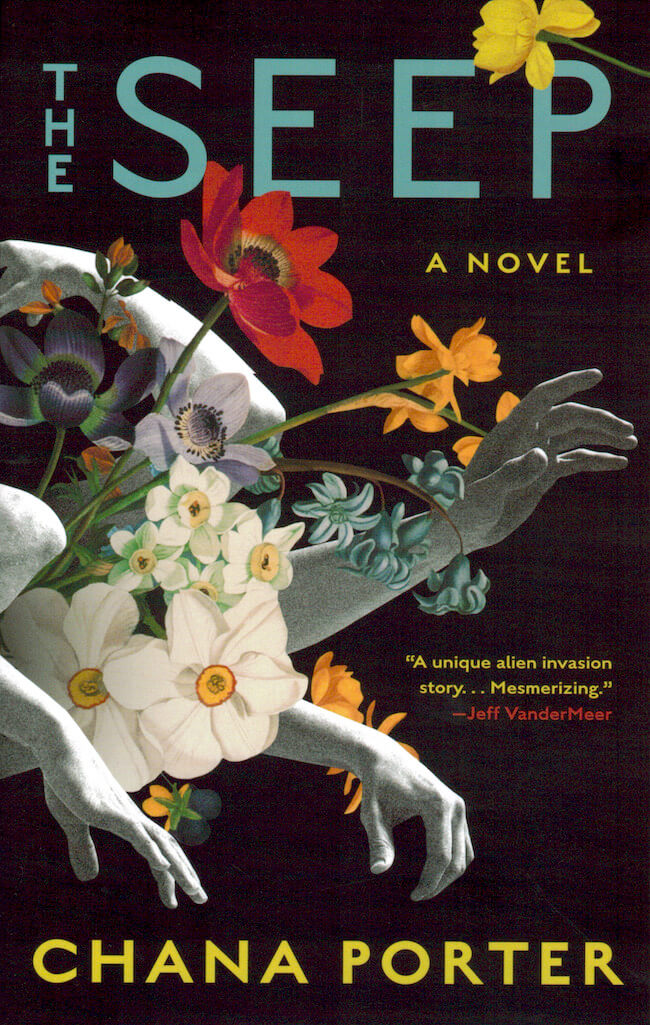
The Seep
A blend of searing social commentary and speculative fiction, Chana Porter's fresh, pointed debut explores a strange new world in the wake of a benign alien invasion.
Trina Fast Horse Goldberg-Oneka is a fifty-year-old trans woman whose life is irreversibly altered in the wake of a gentle, but nonetheless world-changing, invasion by an alien entity called The Seep. Through The Seep, everything is connected. Capitalism falls, hierarchies and barriers are broken down; if something can be imagined, it is possible. Trina and her wife, Deeba, live blissfully under The Seep's utopian influence, until Deeba begins to imagine what it might be like to be reborn as a baby, which will give her the chance at an even better life. Using Seeptech to make this dream a reality, Deeba moves on to a new existence, leaving Trina devastated. Heartbroken and deep into an alcoholic binge, Trina follows a lost boy she encounters, embarking on an unexpected quest. In her attempt to save him from The Seep, she will confront not only one of its most avid devotees, but the terrifying void that Deeba has left behind. A strange new elegy of love and loss, The Seep explores grief, alienation, and the ache of moving on.
A 2021 Lambda Literary Award Finalist.
Chana Porter is a playwright, teacher, MacDowell Colony fellow, and co-founder of the Octavia Project, a STEM and fiction-writing program for girls and gender non-conforming youth from underserved communities. She lives in Brooklyn, New York, and is currently at work on her next novel.
Published Dec 2020

My Mother: Demonology
Based loosely on the relationship between Colette Peignot and Georges Bataille, My Mother: Demonology is the powerful story of a woman's struggle with the contradictory impulses for love and solitude. At the dawn of her adult life, Laure becomes involved in a passionate and all-consuming love affair with her companion, B. But this ultimately leaves her dissatisfied, as she acknowledges her need to establish an identity independent of her relationship with him. Yearning to better understand herself, Laure embarks on a journey of self-discovery, an odyssey that takes her into the territory of her past, into memories and fantasies of childhood, into wildness and witchcraft, into a world where the power of dreams can transcend the legacies of the past and confront the dilemmas of the present. With a poet's attention to the power of language and a keen sense of the dislocation that can occur when the narrative encompasses violence and pornography, as well as the traumas of childhood memory, Kathy Acker here takes another major step toward establishing her vision of a new literary aesthetic.

Elizabeth in the Woolds
Elizabeth in the Woolds is the product of two superimposed compositional strategies; a thematic aggregate based on notes dating back to 2008 and an epic prose narrative. Elizabeth is the device through which this simultaneous register moves. Screen writing provides a model for multiple voices. In a film script, the narrator can be the camera; there’s a machine at the centre of the story structure which figures a demand for resolution of plot; a contrario, the thematic approach (S, U, N, as electric light) obliterates chronology, and enumerates an atemporal topological figure, or the way the world is built.
(730pp., self-published first edition of 50, Kortrijk, 2021)